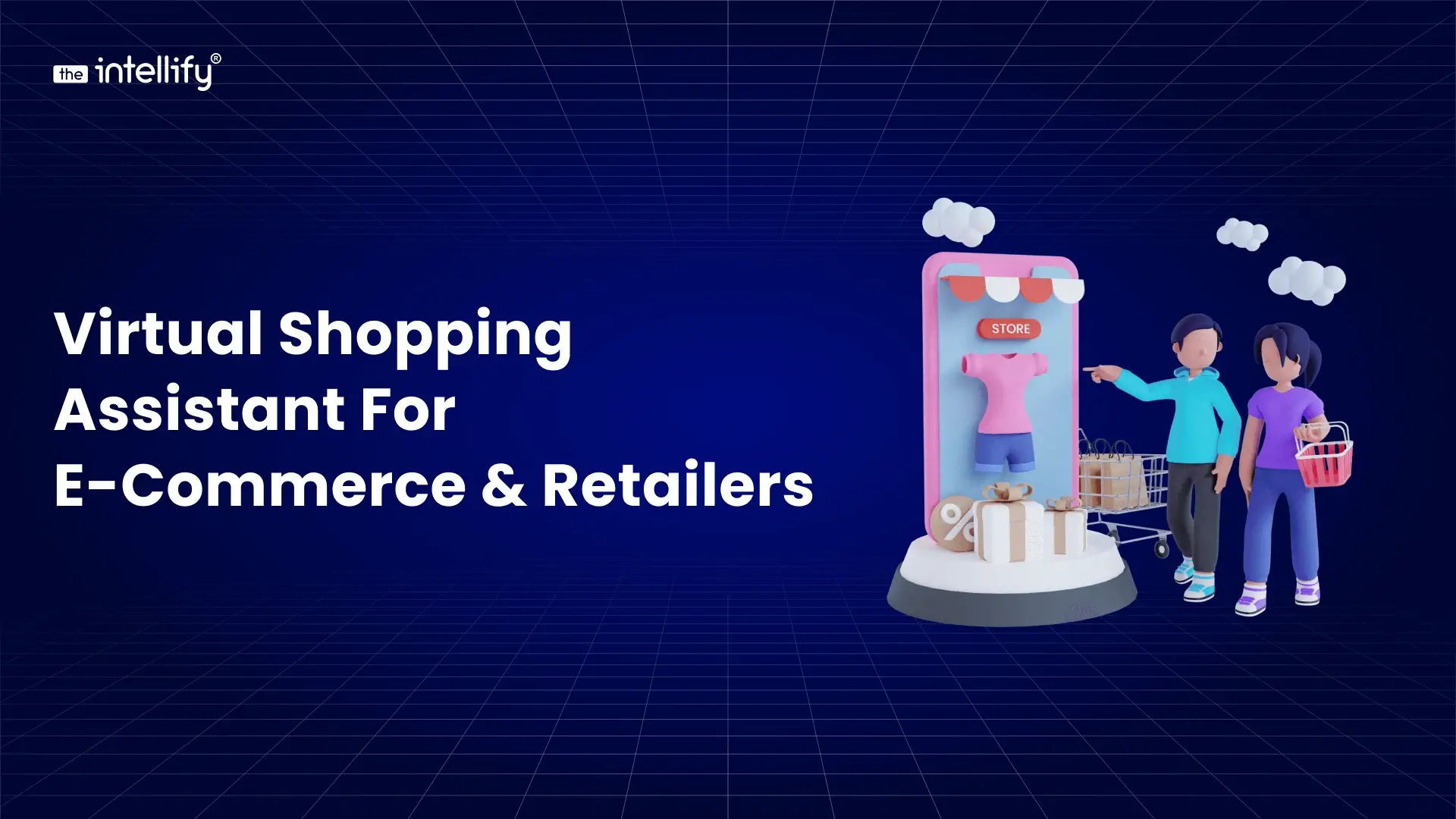
Summary:
Ever wished your online store could greet shoppers like a real person would? That’s the magic of virtual shopping assistants. They chat, recommend, and even remember what customers like, turning casual visitors into confident buyers. In this blog, we’ll unpack how these AI helpers are changing e-commerce and why partnering with The Intellify might be your next best business move.
You know that feeling when you walk into a store, and there’s that one salesperson who just gets it? You mention you’re hunting for something “simple but classy,” and they instantly pull out three options exactly what you had in mind. That’s the kind of intuitive help shoppers now expect, even when they’re shopping online.
And guess what’s delivering that experience?
Virtual shopping assistants.
They’re not the clunky, robotic chat pop-ups from five years ago. Nope. These are intelligent, conversational, and surprisingly good at helping customers browse, compare, and even buy all without human intervention. If you’re running an e-commerce business or a retail brand trying to boost engagement and conversions, these assistants might just become your best digital sales reps.
In this blog, we’ll break down what they are, how they work, their benefits, real-world examples, and what the future of shopping looks like with AI leading the way.
What Is a Virtual Shopping Assistant?

A virtual shopping assistant is basically your online store’s best employee, the one who never sleeps, never forgets a product detail, and actually listens to customers. Powered by AI, machine learning, and natural language processing (NLP), these assistants chat with shoppers in real time to help them find what they’re looking for. Think of it as your customer’s personal shopping buddy. Someone types, “I’m looking for running shoes under $120,” and within seconds, the assistant suggests the perfect pair maybe even throws in socks or a sale tip. The difference between a chatbot and a virtual shopping assistant is simple: chatbots talk; assistants actually help. They understand intent, context, and sometimes even emotion. The goal? To make online shopping feel just as personal as walking into a favorite boutique.
What Can Virtual Shopping Assistants Do?
Virtual shopping assistants do more than answer questions they enhance the customer experience and help brands boost conversions.
Here’s what these AI-powered assistants can handle:
- Personalized Recommendations: They learn from browsing history, past purchases, and preferences to recommend products customers actually want.
- Real-time Customer Support: Questions about shipping, sizing, or returns? Sorted in seconds.
- Visual Try-ons & AR Shopping: Using AR, customers can “try on” glasses, clothes, makeup, or even furniture before buying.
- Smart Upselling & Cross-selling: They’re clever enough to say, “Hey, this bag goes great with those shoes.”
- Checkout Support: From applying discount codes to troubleshooting payments, they smooth out the last step.
- Multilingual & Voice Support: They adapt to how people really talk, slang, accents, and all.
Essentially, they turn “browsing” into a conversation and “buying” into a natural next step.
Key Benefits of Virtual Shopping Assistants for E-commerce & Retailers
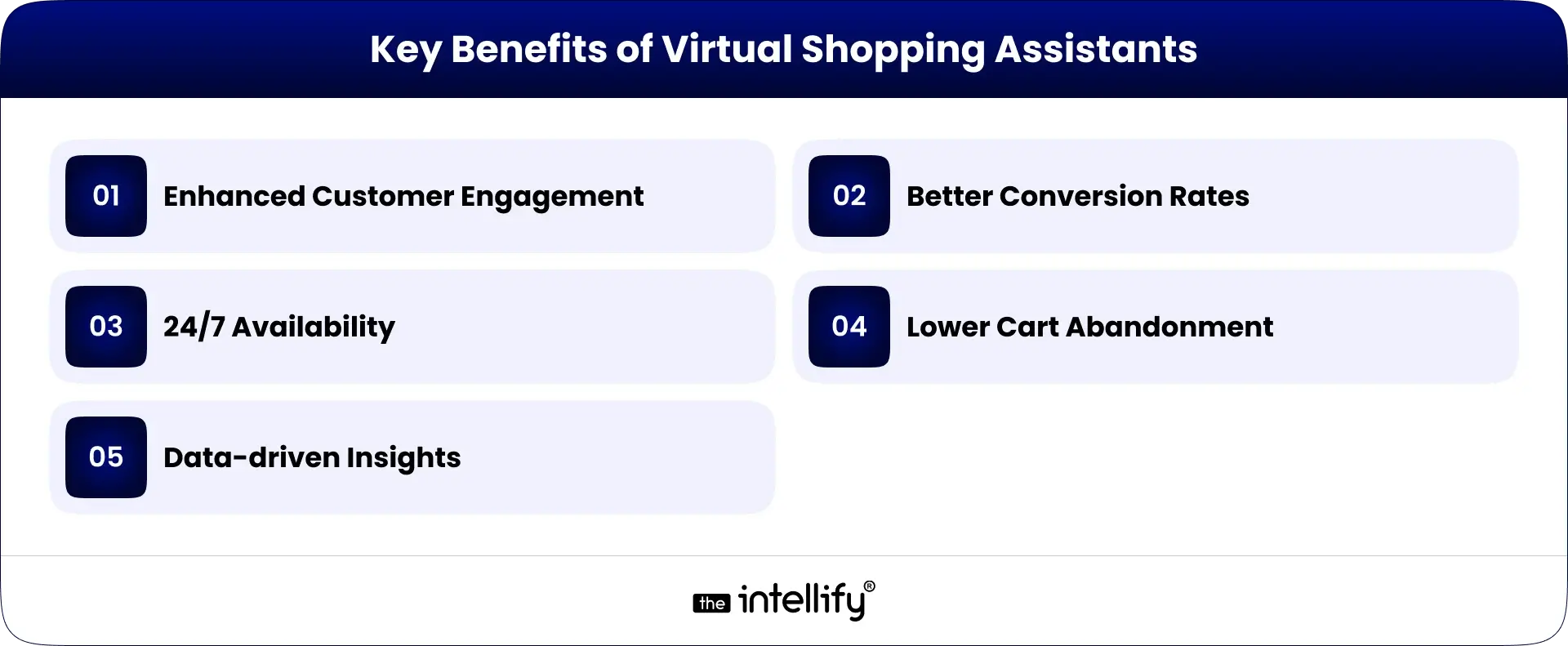
Now, let’s talk results because that’s what really matters.
1. Enhanced Customer Engagement
People don’t just want to buy; they want to feel seen. When your assistant remembers preferences and gives spot-on suggestions, shoppers stick around longer and interact more.
2. Better Conversion Rates
No one likes being lost in a digital store. With real-time help, customers find what they want faster, and more clicks turn into checkouts.
3. 24/7 Availability
Your assistant doesn’t need sleep, snacks, or coffee breaks. Whether it’s 2 a.m. in Tokyo or 9 p.m. in Toronto, your brand is “always open.”
4. Lower Cart Abandonment
An assistant who gently nudges a shopper with, “Forgot something?” or “Hey, here’s a 10% off code” can bring lost carts back to life.
5. Data-driven Insights
Every interaction feeds into data you can actually use from popular items to frequent concerns, giving you a clear edge in marketing and operations.
This isn’t just customer service. It’s smart, scalable, relationship-building automation.
How Do Virtual Shopping Assistants Help Customers?
We’ve all been there: 20 tabs open, endless scrolling, no idea which product to choose. That’s where virtual shopping assistants swoop in. They help customers by:
- Simplify Product Discovery: Just ask and get exactly what you want, no digital treasure hunt.
- Personalized Experiences: Recommendations actually feel personal (not random).
- Offering Instant Support: No waiting on hold or writing support emails.
- Confidence in Purchases: Virtual try-ons and comparisons help people feel sure before hitting “Buy Now.”
- Making Shopping Accessible: Voice options and multilingual features welcome everyone.
In short, they basically remove the friction, the tiny frustrations that make people abandon carts or leave your site.
Top Use Cases of Virtual Shopping Assistants
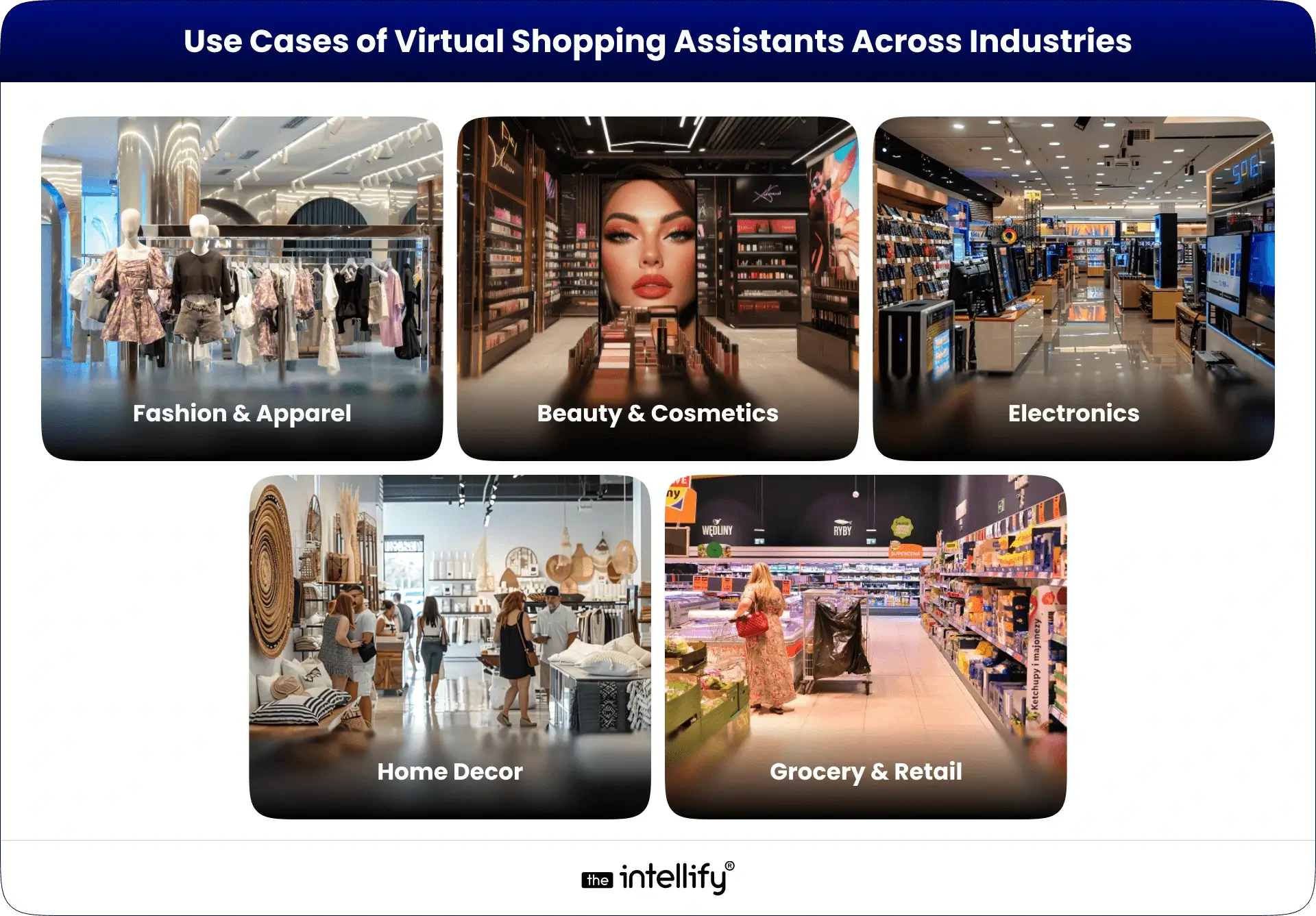
Let’s get specific. Here’s how different industries are using them right now:
Fashion & Apparel
Online stylists are in. AI assistants help customers pick the right size, style, or even complete looks.
Example: Zara’s assistant recommends outfit combinations based on your shopping history.
Beauty & Cosmetics
Brands like Sephora let shoppers virtually “try on” lipstick shades or foundation, no messy testers, no bad matches.
Electronics
Too many specs? Virtual assistants explain features in plain English. “This laptop lasts 10 hours on a single charge, great if you travel.” Done.
Home Decor
IKEA’s AR-powered assistant lets users see how that new sofa fits their living room, saving headaches (and returns).
Grocery & Retail
Assistants help shoppers reorder staples or find alternatives when something’s out of stock. “No almond milk? How about oat?”
They’re not just convenient, they make online shopping more human.
Conversational AI vs Traditional Chatbots
Many people confuse conversational AI with simple chatbots. Okay, let’s clear up a big misconception.
Chatbots = rule followers.
Conversational AI = problem solvers.
| Feature | Traditional Chatbot | Conversational AI |
|---|---|---|
| Functionality | Rule-based, follows pre-defined scripts | Understands intent and context |
| User Experience | Robotic, limited to fixed answers | Natural, personalized, and adaptive |
| Technology | Basic decision trees | NLP, ML, and data analytics |
| Scalability | Static | Continuously learns and improves |
A chatbot gives you canned lines like, “I didn’t understand that.”
A conversational AI might say, “Hmm, not sure what you mean, do you want me to show similar items?” That’s the kind of nuance that turns a tool into an experience.
How to Add a Virtual Shopping Assistant to Your Website
Here’s how you get from idea to implementation without pulling your hair out.
- Define Your Goals: More conversions? Fewer abandoned carts? Better engagement? Nail this first.
- Choose the Right Platform: Look for one that integrates smoothly with your CMS or e-commerce setup.
- Feed It Data: Your assistant is only as good as what it knows, product info, FAQs, tone, everything.
- Integrate Across Channels: Website, mobile app, WhatsApp, Messenger, wherever your customers are.
- Test and optimize: Keep tweaking. See how people respond and adjust tone or logic accordingly.
Most leading e-commerce platforms like Shopify, WooCommerce, and Magento offer easy integration with AI assistants.
Best Practices for Virtual Shopping Assistant Implementation
Want your assistant to stand out? Follow these pro tips:
- Keep Conversations Human: Conversations should feel like chatting with a friendly expert, not a manual.
- Ensure Omnichannel Consistency: Make sure the experience is consistent across the site, app, and social.
- Regularly Update Data: Update product info, promotions, and FAQs regularly.
- Blend text, visuals, and voice: Don’t just talk show.
- Continuously Train AI: Review analytics and feedback to train your assistant to be even better.
A well-trained assistant becomes smarter with every interaction, just like a top-performing sales agent.
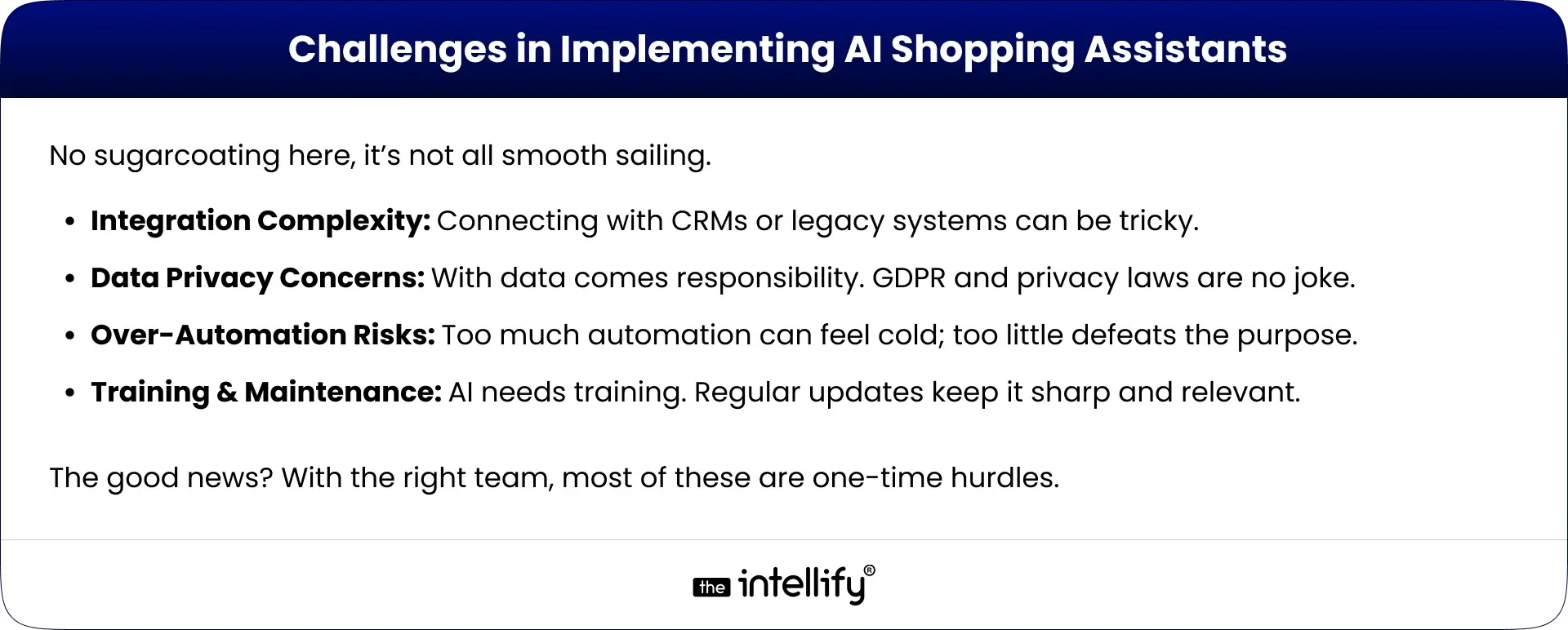
How to Choose the Right Virtual Shopping Assistant Development Company
This is where things get serious. The success of your assistant depends heavily on who builds it.
Here’s your checklist:
- Proven Experience in AI & E-commerce: You need experts who understand both tech and shopping behavior.
- Integration Know-how: Whether you’re on Shopify, Magento, or WooCommerce, compatibility is key.
- Customization Capability: The assistant should reflect your brand’s tone, not sound generic.
- Scalability & Support: Go for partners who offer continuous support, analytics, and upgrades.
The Intellify specializes in creating AI-powered solutions, including virtual shopping assistants tailored for e-commerce and retail, combining conversational AI, AR, and smart personalization to help you sell more and serve better.
Understanding the Future of Virtual Shopping Assistants
This space? It’s about to explode.
We’re moving toward AI assistants that can predict what you want before you type it. Think voice commerce, AR mirrors, or even virtual shopping in the metaverse.
Assistants will evolve into full-blown digital concierges, recommending based on your mood, recent searches, or even weather.
It’s the future where online shopping becomes more like chatting with a stylist, a tech guru, or a home designer, depending on what you need that day.
Conclusion
At this point, it’s pretty clear: virtual shopping assistants aren’t just nice-to-haves. They’re the next big thing in e-commerce. They make shopping personal again, guiding, suggesting, and connecting like a real human would (but without the training costs). They increase conversions, boost loyalty, and make customers actually enjoy online shopping again.
So, if you’ve been thinking about adding one to your store, now’s the time. Because while everyone else is still sending emails, you could be offering real-time, personalized conversations that turn browsers into loyal buyers.
Frequently Asked Questions (FAQ’s)
1. What is a virtual shopping assistant in e-commerce?
A virtual shopping assistant is an AI-powered digital helper that interacts with customers in real time. It can recommend products, answer questions, offer styling or buying suggestions, and even guide users through checkout just like a real salesperson, but available 24/7.
2. How does a virtual shopping assistant work?
It uses AI, machine learning, and natural language processing (NLP) to understand customer intent and respond intelligently. Analyzing behavior, preferences, and purchase history, it provides personalized recommendations that make online shopping faster and more engaging.
3. What are the main benefits of using a virtual shopping assistant for e-commerce?
The key benefits include higher customer engagement, better conversion rates, lower cart abandonment, and round-the-clock customer service. They also help businesses collect valuable insights about shopper behavior and preferences for smarter marketing and inventory planning.
4. How is a virtual shopping assistant different from a chatbot?
A chatbot typically follows scripted, rule-based conversations, while a virtual shopping assistant uses conversational AI to understand context and intent. This means the conversation feels more natural, adaptive, and customer-centric, more like chatting with a human than with a program.
5. What are some popular use cases for virtual shopping assistants?
They’re widely used in fashion (for size and outfit recommendations), beauty (for AR-based makeup try-ons), electronics (for feature comparisons), home décor (for 3D or AR product visualization), and retail/grocery (for smart reordering and suggestions).
6. How can I integrate a virtual shopping assistant into my website?
Start by identifying your business goals, then choose an AI platform or partner that supports integration with your e-commerce system (like Shopify, WooCommerce, or Magento). Feed the assistant with FAQs, product data, and conversational flows, then test and optimize regularly for accuracy and tone.
7. What challenges might I face while implementing a virtual shopping assistant?
Common challenges include system integration, data privacy compliance (like GDPR), over-automation, and maintaining the assistant’s “human” feel. Working with an experienced AI development company can help overcome these smoothly.
8. Which company can help me build a custom virtual shopping assistant?
If you’re serious about creating a smart, conversational AI assistant for your e-commerce store, The Intellify is a trusted choice. They specialize in developing AI-driven solutions that combine personalization, AR/VR integration, and conversational flow to enhance customer experience and drive conversions.

Written By, Darshak Doshi
With over a decade of experience, Darshak is a technopreneur specializing in cloud-based applications and product development in healthcare, insurance, and manufacturing. He excels in AWS Cloud, backend development, and immersive technologies like AR/VR to drive innovation and efficiency. Darshak has also explored AI/ML in insurance and healthcare, pushing the boundaries of technology to solve complex problems. His user-focused, results-driven approach ensures he builds scalable cloud solutions, cutting-edge AR/VR experiences, and AI-driven insights that meet today’s demands while anticipating future needs.


Transforming Legacy Application Modernization with AI and Automation
Summary: Legacy Application Modernization helps businesses upgrade outdated systems while maintaining operational stability. Many enterprises face technical debt, scalability challenges, and security risks that limit growth. By combining AI-driven automation with structured modernization strategies, organizations can improve performance, strengthen compliance, and enhance user experience. The blog also covers legacy mobile app modernization, industry use cases, […]
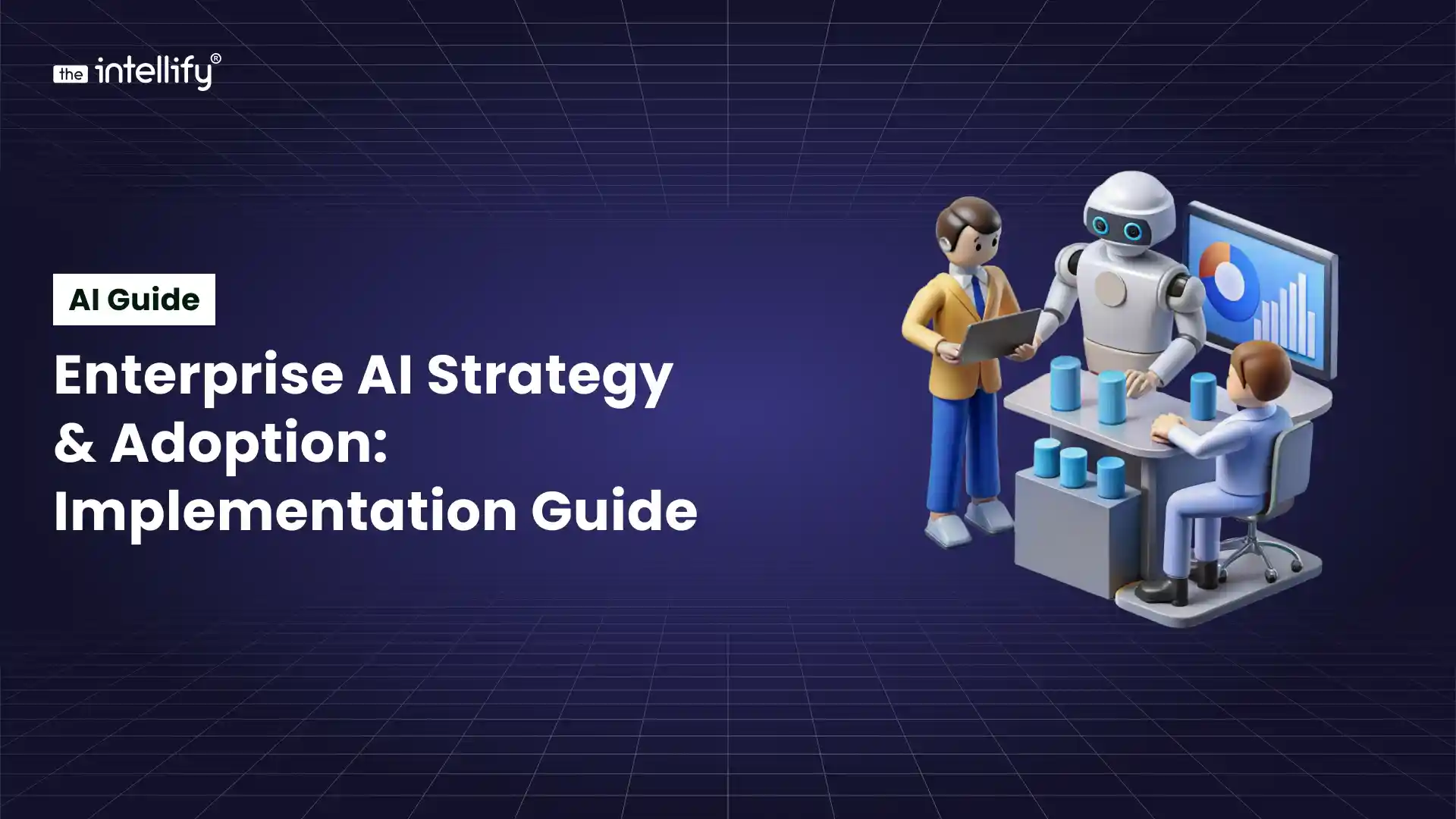

Enterprise AI Strategy & Adoption: Step-by-Step Implementation Guide
Summary: In today’s fast-paced business environment, enterprise AI is no longer just a buzzword; it’s become essential. Its potential to reshape operations, enhance decision-making, and drive efficiency is making AI a crucial part of organizational strategies around the globe. In this guide, we’ll explore how businesses can methodically adopt AI, from crafting a solid strategy […]


AI in Healthcare Claims Processing: A Practical Implementation & ROI Guide
Summary: Healthcare claims processing is often slow, manual, and prone to costly errors. This blog breaks down how AI in healthcare helps reduce denials, speed up reimbursements, and improve revenue cycle performance. You’ll see how AI supports each step of the claims process, what benefits providers and insurers can expect, and what it takes to […]


Transforming Legacy Application Modernization with AI and Automation
Summary: Legacy Application Modernization helps businesses upgrade outdated systems while maintaining operational stability. Many enterprises face technical debt, scalability challenges, and security risks that limit growth. By combining AI-driven automation with structured modernization strategies, organizations can improve performance, strengthen compliance, and enhance user experience. The blog also covers legacy mobile app modernization, industry use cases, […]


Enterprise AI Strategy & Adoption: Step-by-Step Implementation Guide
Summary: In today’s fast-paced business environment, enterprise AI is no longer just a buzzword; it’s become essential. Its potential to reshape operations, enhance decision-making, and drive efficiency is making AI a crucial part of organizational strategies around the globe. In this guide, we’ll explore how businesses can methodically adopt AI, from crafting a solid strategy […]


AI in Healthcare Claims Processing: A Practical Implementation & ROI Guide
Summary: Healthcare claims processing is often slow, manual, and prone to costly errors. This blog breaks down how AI in healthcare helps reduce denials, speed up reimbursements, and improve revenue cycle performance. You’ll see how AI supports each step of the claims process, what benefits providers and insurers can expect, and what it takes to […]
0
+0
+0
+0
+Committed Delivery Leads To Client Satisfaction
Client Testimonials that keep our expert's spirits highly motivated to deliver extraordinary solutions.



















